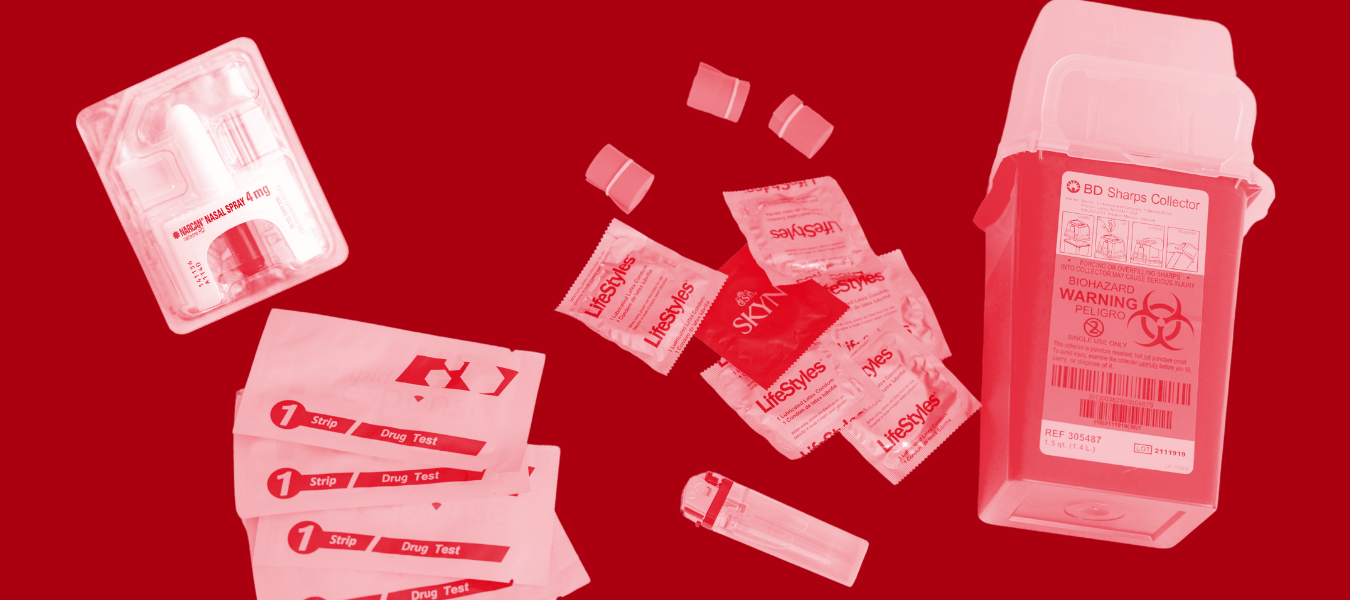In recent years, chemsex has become more visible within parts of the queer community. Chemsex–the use of drugs to enhance or facilitate sexual experiences is a part of many queer people’s lives–from enhancing pleasure and sexual endurance to helping us survive and cope.
But let’s be real–chemsex can be a difficult thing to talk about. You or someone you may know struggles with addiction. You may have had loved ones die. You may have had a situation where you were pressured or forced to use a substance you didn’t want.
However, chemsex isn’t only harmful. It can–and is–a practice that can be enjoyable. That’s where harm reduction comes in.
As described by National Harm Reduction Coalition, it is “a set of practical strategies and ideas aimed at reducing negative consequences associated with drug use.” Harm reduction isn’t about encouraging drug use or ignoring the very real harms that can accompany drug use. It’s about offering people practical, accurate information so they can make the best choices for themselves. That’s the same way we discuss sexual health–think using doxyPEP and PrEP but not condoms to prevent HIV and STIs.
Let’s be clear: your safety and well-being matter. With access to accurate information, safer use supplies (like sterile syringes and naloxone), and support, chemsex can be made safer. However, it can become harmful when it leads to a loss of control or impacts your daily life in negative ways. It’s not about the specific drugs–it’s about how someone feels and functions in relation to their use.
The desire for sexual exploration is real—and valid. But just as we make informed choices with our partners, we can also make informed choices around substances. Harm reduction is about giving yourself the tools to stay safer, not judging how you play.
If you or your friends are having chemsex, here’s some quick tips:
- Stay informed: Seek out science-based information on drug use from trusted organizations like National Harm Reduction Coalition and DanceSafe. Updated information on your sexual health can be found in a variety of places, including at Building Healthy Online Communities (click here for the global version) and your country’s national ministries of health.
- Get familiar with your drugs: Know what you’re taking, the dosage, and interactions with other substances. Regardless if you’re taking meth or MDMA, test every drug, every time you use it. The most common test strips are for fentanyl and xylazine while other drugs (like MDMA) have reagent kits. This way, you’ll know if your drugs are cut with a substance that could cause an overdose and plan accordingly.
- Plan ahead for emergencies: Even when prioritizing your pleasure, having a safety plan in mind for when things do go wrong will help you stay confident. Learn how to use naloxone to reverse an overdose, find out what to do when someone is overamping (a stimulant overdose), and make sure to have a sober spotter in larger groups who can help manage any issues as they come up. AIDS United has a chemsex guide for groups with tips on how to prepare ahead of time.
- Access support. You deserve to feel good about your sex life. Drugs can make us open to new experiences. Sometimes we say yes in the moment and later feel shame or regret. Take time to think about what felt okay, what didn’t, and what you’d want to do differently next time. If chemsex begins to provide more distress than pleasure, organizations like Controlling Chemsex provide support for people who are struggling with their use, including if you want to stop using altogether.
- Get consent every single time: Consent applies to having sex, what drugs you use and how much, and taking photos or videos of a session. If someone is incapacitated and cannot say no even if they want to, and someone has sex with them–that is assault.
- Reduce stigma online. If you’re looking for enhanced fun, it can be hard to share that easily online. Some dating apps have places where people can indicate their use or disinterest in chemsex. And if you’re not interested? You can just say that you aren’t and keep looking.
- Don’t forget your sexual health: Chemsex is about drug use during sex after all. Get tested for HIV and STI every 3 to 6 months. You also might be able to order a free home test. Check out this global list of clinics and home testing programs. Consider using condoms, and/or starting PrEP (if you’re HIV-negative) or doxyPEP to prevent HIV and STIs.
Shame and stigma keep the chemsex conversation in the closet, meaning more people won’t be prepared or seek help when they need it most. Whether you’re having chemsex, looking to step away from it, or know someone who is, we all have a stake in amplifying this lifesaving information.



I love using poppers when having sex. It immediately makes me so horny. My best time ever was when I was dressed as a CD and came repeatedly for about 45 seconds. I was just so gooned out!
I would love to have a little party and play with someone right now.
I enjoy pure cocaine up my ass and poppers. I fun dip a finger and shove it in, massage it until it dissolves, then lick my finger clean, lube up and drill my ass with my large toys. It really helps gape my ass and take it deep. I’ve even taken two hung studs that way at the same time.
I’m a str8 guy and I wanna get high with a hot gay guy , I get so horny when I’m wired on coke or pnp I lay back spread my legs pull my nipples mmmmyum
Thanks for sharing this timely, concise, thoughtful material for your users to have access to. Chemsex is amazing and fucking hot, but it can also be terrifying and do irreparable harm. Educate yourself and have a great time!